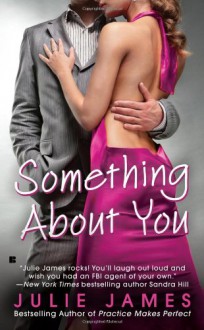
The mystery-as-plot-device is one of the most common tropes in romance, and my absolute least favorite. In Regencies, the lovers come together while eavesdropping behind potted palms in crowded ballrooms, trying to solve the murder of Lord Whosiewhatsis. In steampunks, the lovers come together while tinkering with futuristic devices designed to unmask a spy who threatens the reign of Queen Victoria. In paranormals, the lovers come together in a remote castle in a creepy primeval forest as they try to figure out which group of rival spooks--witches or demons or werechickens or whatever--is responsible for killing the leader of the Vampyre hordes. And then there 's contemporary romantic suspense, and without even cracking the cover you know there's gonna be murder and mayhem and a hot ex-military crime fighter who acts all broody and tough while falling for the smart-mouthed heroine as they exchange snarky banter over bloodsplattered corpses while investigating the latest spate of gruesome serial killings. Snore. I'm a prosecutor: I get enough crime and punishment at work, thank you very much.
Needless to say, I don't read a lot of romantic suspense. I don't like mystery with my romance, and more than any other subgenre, contemporary romantic suspense is steeped in half-baked subplots about murders and rapists and drug dealers and mob bosses, etc., and once you peel away the layers of the criminal underworld, there's often not much romance left to enjoy.
However, one of my goals with this blog is to become a more educated and mindful consumer of romance, and that means setting aside my personal prejudices as a reader and delving into subgenres I don't ordinarily enjoy. I chose Julie James for this foray into the category of romantic suspense because, based on reviews I'd read, her work promised to be more funny than dark, which I hoped meant that the crime-fighting subplot would not overshadow the romance. As it turns out, I chose well: I liked this book more than I expected.
Cameron Lynde is an Assistant U.S. Attorney in Chicago who prosecutes organized crime cases. She's a bit of a wunderkind, having worked her way up to lead all of the other attorneys in her division in trial wins in just four years. (I rolled my eyes and willingly suspended my disbelief at that: four years is not long, in the life of a litigator, especially since complicated RICO cases can stagnate in the courts for ages.) When the story begins, she's treating herself to a night in a swanky hotel, except she's not getting the R&R she'd hoped for because the couple in the adjoining room keep her up all night having noisy, wallbanging sex. She finally complains to the management (peeking out her peephole to watch as the male party to the booty call leaves), and when hotel security finds a dead prostitute in the next room, Cameron finds herself an earwitness to murder.
Special Agent Jack Pallas has a history with Cameron, and not a good one. Three years ago, she dismissed a case against a mobster that he'd spent two years undercover trying to build. He was so angry about it, he badmouthed her to the press, which got him transferred to Nebraska and almost derailed his career. Of course, the very instant he comes back to Chicago, he catches a case where she's the prime witness. Such is the set up for an opposites attract/enemies-to-lovers romance (which may be the only trope more common than mystery-as-plot-device).
As I'd hoped, the mystery remains very much backstory to the romance. Indeed, it isn't so much a mystery at all, since the reader learns the killer's identity in the first third of the book, though suspense continues to build because Cameron remains in danger until the killer is caught. To my relief, Cameron didn't try to slip away from her police guard to do something boneheaded or reckless, the way some Too Stupid to Live heroines might. I liked that Ms. James was able to write Cameron's character in a way that recognized her vulnerability as an endangered witness without making her weak or ridiculous. Cameron didn't seem to view police protection as a threat to her independence, but neither did she hole up in her house like a scared little mouse: she managed to maintain most of her routines and social obligations even while cooperating with the officers charged with guarding her.
I'm often particularly leery of mystery subplots in contemporary romance because authors usually make appalling gaffes in police or courtroom procedure, and since I'm pretty familiar with the criminal justice process, those blunders just jar me out of my enjoyment of the story. (NOTE TO AUTHORS: I am happy to volunteer my editing services to review your manuscripts to help you avoid the kinds of errors that will make the cops and lawyers and constitutional scholars in your audience want to throw your book at the wall in frustration.) Though parts of this story inspired my professional skepticism--the meteoric rise of Cameron's career, the notion that the national news would give a flying fig what Jack said about Cameron three years ago when she dismissed his RICO case--I can forgive those because they moved the plot along. There was only one procedural error that drew my ire--Jack totally bungles a photo lineup by telling Cameron which of the pictures depict suspects in the crime, before giving her the chance to spontaneously recognize anyone--and it was fleeting enough that I quickly got over it.
I really enjoyed the character development and witty dialogue. Cameron and Jack are sarcastic and snarky and sharp, especially at the beginning when they're still angry about their shared history, but they don't cross that line into being so mean to each other that their eventual romance is hard to swallow. The supporting characters, especially Jack's partner Agent Wilkins, and Cameron's best friend Collin, are also well-rounded and given great conversational zingers.
I also found it refreshing that Jack, not Cameron, is the first to start thinking about their developing relationship as something he'd like to see continue for the long-term. After they sleep together, Jack reflects that:
Nearly thirty-five years old, he wasn't exactly innocent--he'd slept with his fair share of women, some he'd even met while working undercover. But all of his relationships had been casual--and he'd made that abundantly clear going into them. In the past, he'd always used his job as an excuse to avoid getting serious with anyone. Now he realized that with the right person, he wouldn't want the excuse.
Jack leaned in, whispering her name softly. He knew he was a greedy, selfish bastard to wake her up, but he loved the reassurance of their intimacy, what it said about their relationship without either of them actually having to say it.
(Loc. 4152)
Seriously, most contemporary romance heroes cut from the alpha-male, military special forces, law enforcement tough guy mold would break out in hives before thinking about things like getting serious and "reassurance of intimacy" after a single sexual encounter, amIright?
Bottom line: I enjoyed this book more than I thought I would, and I'm looking forward to reading more from Julie James -- though I intend to do it slowly, in case the rest of the series pushes my anti-romantic-suspense buttons harder than this book did.


 Log in with Facebook
Log in with Facebook 









